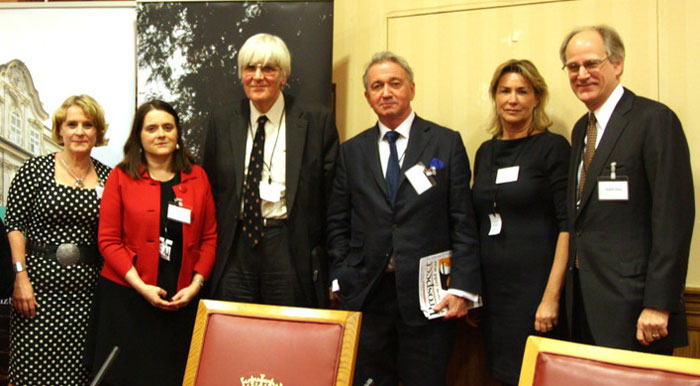
This year marks the 200th anniversary of the Congress of Vienna and the 100th anniversary of the First World War. The former ushered in a century of peace while the latter ignited the most destructive war the world had ever seen. What lessons can the international community learn from those two historical events? Can contemporary leaders be the architects of a new world order, like in 1814, or are they sleepwalking towards a crisis like the rulers of 1914?
These were some of the questions raised in a panel discussion at the House of Lords in London on February 3rd. They will also be the focus of a series of IPI events this year, culminating in a major conference at the Salzburg Global Seminar at the end of August.
On February 3, IPI President Terje Rød-Larsen took part in a panel discussion in the House of Lords on the topic, “What future for Europe–1814, 1914, or something else?” which followed the inaugural Palliser lecture delivered by Edward Mortimer.
In his intervention, Mr. Rød-Larsen noted that “whereas in 1814 and 1914 Europe shaped international affairs, today global developments have a major impact on the future of Europe.” He pointed out how in 1814 the P5 of that time–namely, the Quadruple Alliance of Great Britain, Prussia, Russia, and Austria plus post-Napoleonic France–were united by a sense of shared values and a desire for stability. The Congress of Vienna provided a collective security arrangement that maintained a balance of power for almost a century.
Mr. Rød-Larsen contrasted this system with the breakdown of international relations in 1914. He cautioned that there are dangerous parallels between the contemporary situation in the Middle East and “trouble in the Balkans” a century ago. He also warned that “territorial disputes in the South China Sea, an escalating arms race, as well as rumblings of nationalism in China and Japan recall sabre rattling in Europe a century ago.”
He warned that the international system is not fit for purpose to deal with contemporary threats and challenges: “it is broken–it needs an overhaul,” Mr. Rød-Larsen said. “Perhaps we need the contemporary equivalent of the Congress of Vienna to reshape international institutions.” To that end, he proposed the creation of an Independent Commission on Multilateralism.
IPI, in cooperation with the Salzburg Global Seminar, will be organizing a series of events throughout the year on lessons learned from 1814 and 1914 for contemporary international relations.







